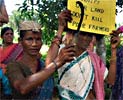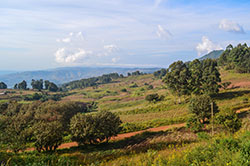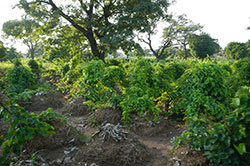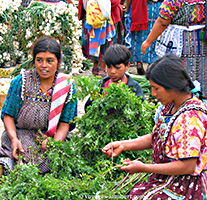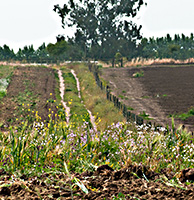South-east Nigeria – around 1910 (1)
'Do you think that money grows on trees in my garden?'
“No, no, no, I won't go to Efuru.” Nwabata turns away, rolls over with a jerk on the conjugal bed, putting her face to the wall. “Please, my wife, be reasonable,” Nwosu tries carefully, “what else can we do? You know that we need money for the new season. We have to hire people to prepare the land, and we have to buy small yams to plant. Otherwise there will be no harvest, nothing.”
Furiously Nwabata turns back to her husband and shouts at him, “You were the one who wanted to party with your friends when we sold our yams, instead of paying back our loan to Efuru. You think we should give our second daughter also to Efuru as collateral? No way, I am not even going to consider it! I'd rather die first."
The next evening Nwabata tells her husband that she wants to visit Efuru. They go together. Efuru is happy to see them. Her helper, Ogea, the daughter of Nwabata and Nwosu, is excited to see her parents. “Oh, that's nice of you,” Efuru grumbles good-heartedly, “I haven’t seen you for ages. Hey, that little one on your back, is that Idika? What a sweetheart, how old is he? Already four months? Now you see how long you haven’t visited me.”
When there is a silence, Nwabata seizes the opportunity. “Efuru, could you please help us again? We need money for the planting season. We are broke.” “You need money?” Efuru responds angrily. “After the last harvest you didn't bring me any yam. You even didn't come to tell me you couldn't repay a part of the loan. I paid everything for you, Nwosu, when you were ill. But you didn't visit me once, when you were better. Do you think that money grows on trees in my garden?”
Defeated, Nwabata and Nwosu look at the ground. Efuru is right, but a life in poverty isn't so simple. Then, to their surprise Efuru asks, “How much do you need?” “Anything you want is good,” Nwosu says softly. “Will ten pounds be enough? Ogea, bring me the little case from the sleeping room.” When Ogea has left the room, Efuru says in a low voice, “I’m doing it because I am so fond of Ogea.”
A little later Nwabata and Nwosu walk home, in good spirits, but silently. That night they sleep peacefully, for the first time in a long while.
_______________________
Source
The book Efuru (1966) written by the Nigerian author Flora Nwapa is about the sadness of a woman who cannot bear children. But at the same time it gives an impression of the peasant life.
Go to:
= part 2, the next page: The disobedient girl - South-east Nigeria – around 1910 (2), story 51.
= the Table of contents, story 50.
